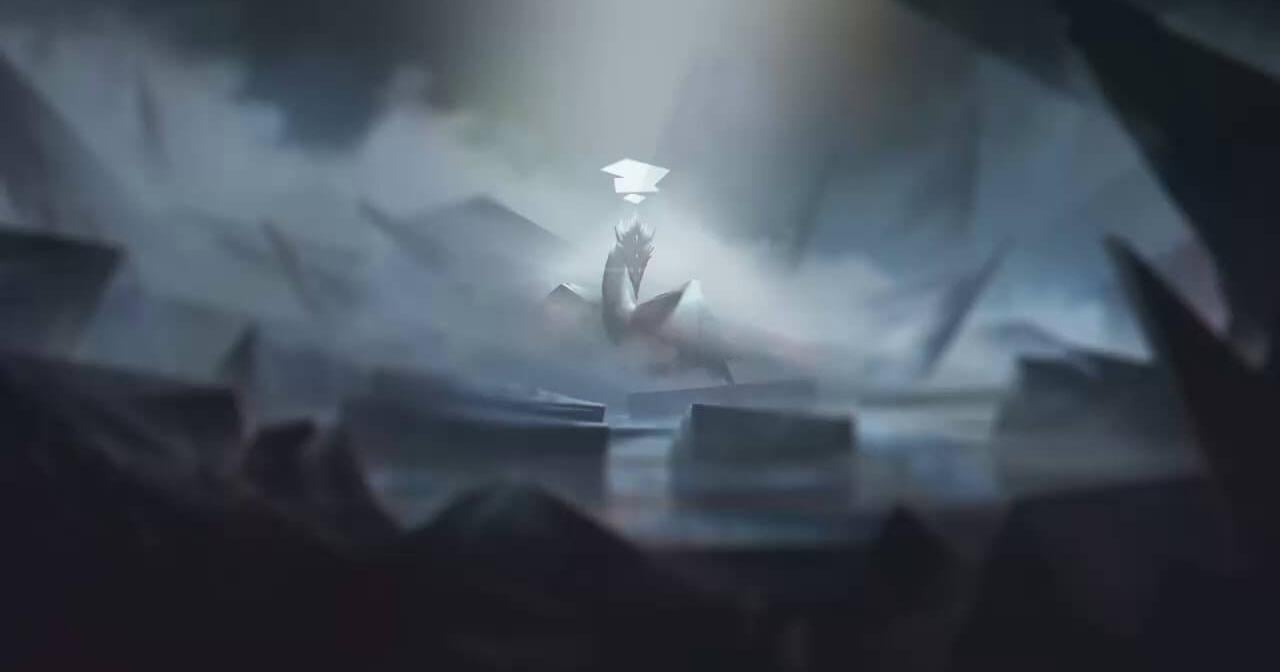Introduction
Thanks to this Weibo lore article for the caladrius lore and Reddit user u/Yomihime for relating it to Mephisto in the story plus the extra Mephisto trivia at the end.
The previous Mephisto and Faust lore article relating to Faust the play:
Mephisto gets a second article because I've always wondered about the bird form in Chapter 8. And he's interesting, despite being so disliked.
Caladrius
Knowing that this is a bird that loves to sing and heals, we can conclude that Mephisto’s reference is that of a Caladrius, a mythical bird that originated from Europe’s plague in the middle ages.
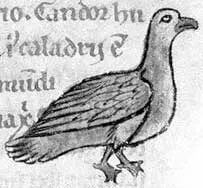
▲Beinecke Rare Book and Manuscript Library, MS 189, Folio 7r A
The caladrius is a bird that has unbelievable healing powers towards the illnesses of people. This is a snow white bird, known for its exotic singing and beauty. Its claws are fine and its whole body is white. It resembles a heron and this becomes the speculation of a prototype in some believers.
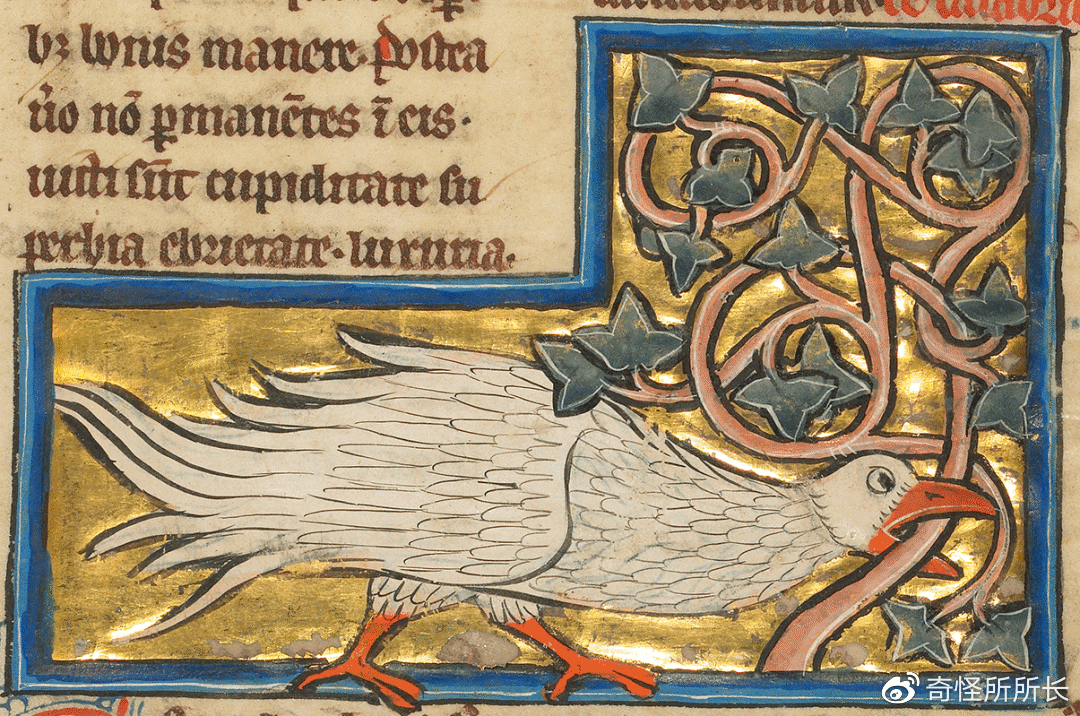
▲1278–1300. The J. Paul Getty Museum, Ms. Ludwig XV 4, fol. 74
In the myths, they usually live in the palaces of kings. But the people believe that the caladriuses will fly into the houses of commoners to cure the sick. They are birds that bring survival and hope.
No matter if the patient is on their dying breath, as long as there are signs of life, the caladrius will use its mouth to suck the air of illness. They bring the illness and pain of people on itself. Then as they spread their wings to fly into the sun, the light and heat from the sun will let the illness be excreted out in the form of sweat. But if the person is terminally ill, or those completely without any hope of recovery, the caladrius will look to the other side and completely ignore the patient. They predict if one will live or die, and cure illnesses.
In the lore, Mephisto uses his breath to heal people, and his powers only work on those who are not dead. While he doesn’t receive their illness, he likes to claim that his Arts takes away his comrades’ pain and suffering. But instead of destroying their illness, he accelerates it, robbing the subjects of their free will. This is probably related to the fact that his men are completely hopeless without him, and instead he makes a good use of what remains of their life force to be the living embodiment of their ideals regardless of what they actually desire, because Mephisto believes Reunion to be the symbol of the Infected’s strength.
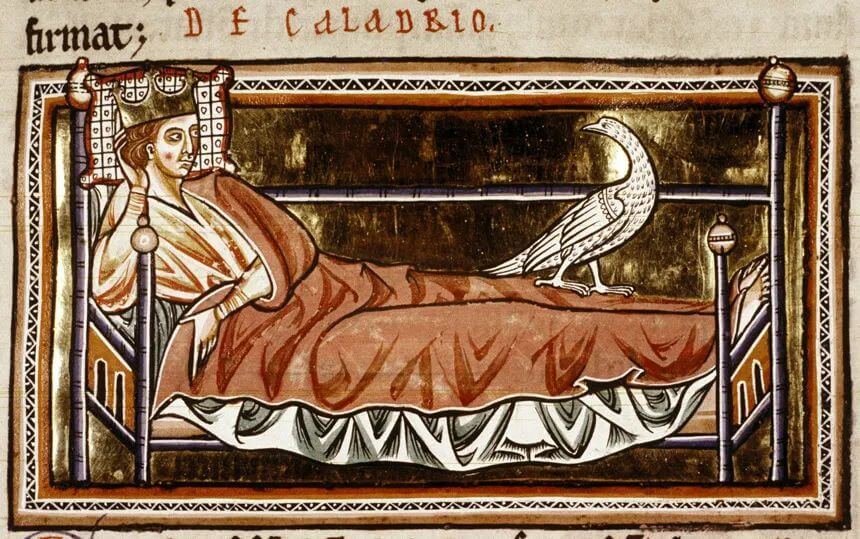
▲Bodleian Library, MS. Ashmole 1511, Folio 69r
But in many related drawings in the Middle Ages, two very different scenes appeared. People have different looks. Some patients are sad because they saw the caladrius, while others are happy. The caladrius predicts whether people live or die, and cures their illnesses.
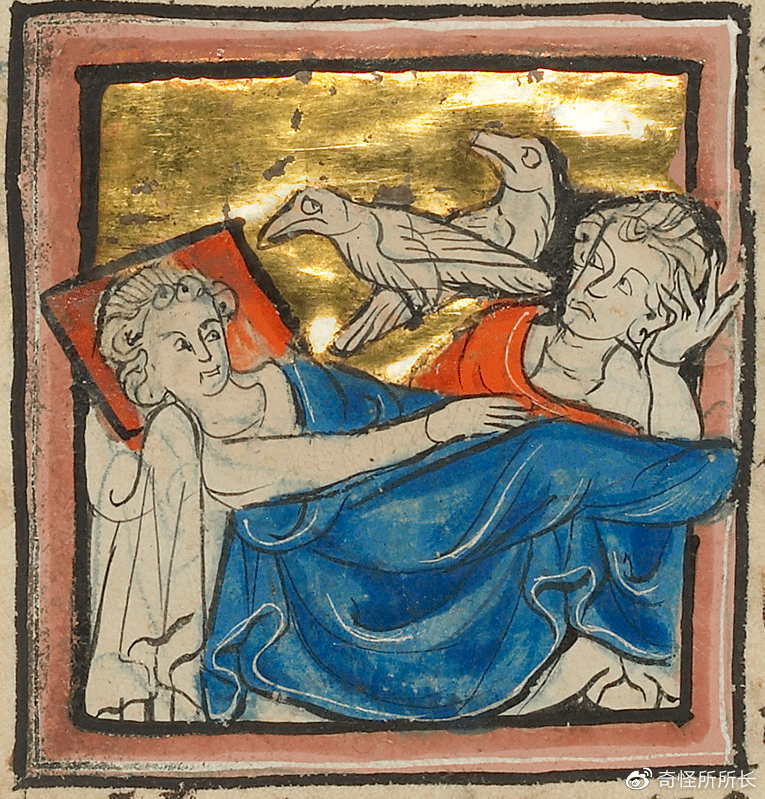
▲1278–1300. The J. Paul Getty Museum, Ms. Ludwig XV 4, fol. 45v
Such contrast is a shadow of history. For example, during the outbreak of the military war of the Crusades, most of the patients in the paintings looked at the caladrius in despair; during the peaceful years, the patients in the paintings would be happy and joyful. The intertwining of hope and despair is also the most distinctive feature of Mephisto. A boy who is otherwise harmless during peaceful times, becomes the messenger of death when Reunion ‘needs’ him the most.
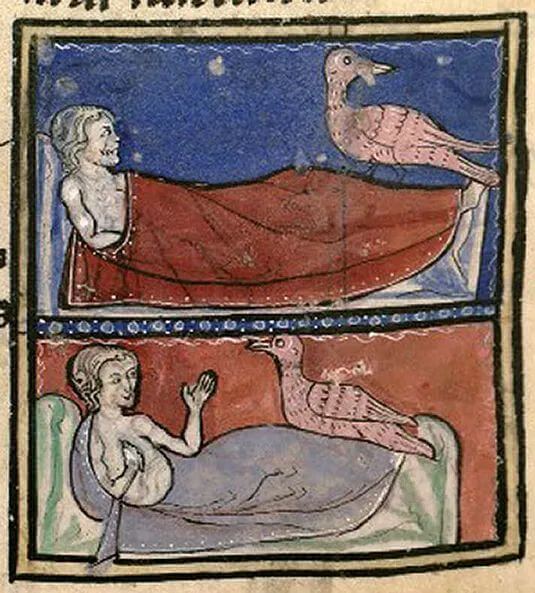
▲Bibliothèque Nationale de France, lat. 14429, Folio 106v
On another hand, the caladrius is part of the fables of Europe’s Middle Ages. They represent the holiness of Christ. People believe that Christ will only abandon those who do not repent and cannot be saved, such as Jews who do not believe in Christ. Caladrius birds will not take away their diseases, just as their sins will not be redeemed by Christ.
Mephisto similarly made a very clear distinction between those who are his comrades and those who aren't, those who will be saved and those who are damned. When he found out that Ch'en is Infected, he tried to get her to his side, to no avail.
But if they have a shred of regret, the caladrius will take away people’s illness, like how Christ shouldered their sins. Fix their wrongs and forever redeem all believers.
In Mephisto’s ‘Singer’ form, a sacred halo like that of Christ appeared above the head, similar to the halo of the Sankta. But the difference is: it becomes a weird black prism.
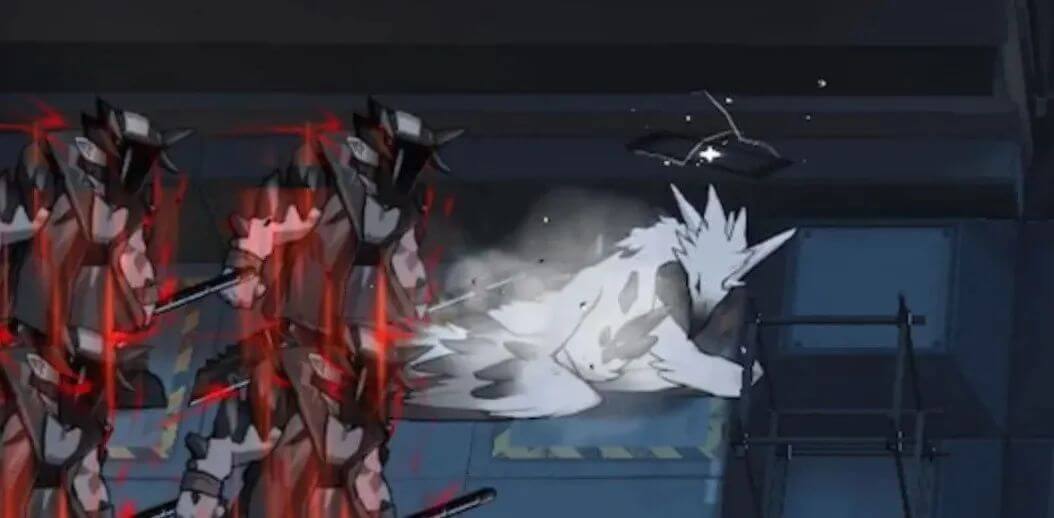
Just as the lion is the king of beasts and the eagle is the king of birds, they have become a symbol of Christ because of their own excellent qualities. The same is true for the pure white caladrius, without a trace of black that is related to sin.
Mephisto, despite the sins he has committed, has nothing but the purest intention to help those in need, and only those whom he views deserving of his ‘help’ in his eyes. His warped psychology however, means that whenever he desires to help someone, he’ll only end up making it worse instead. Which is best illustrated when he killed his abusive family just to please Faust and tried to liberate the Infected in the image of Talulah’s vision.
Likewise, this is reflected in the characteristics of the ‘Singer’ which form contrary to it: it should have been white all over, but it is covered with black Originium crystals. The halo on the top of the head is no longer bright, and it has become a strange black.
In the myths of the caladrius, after transferring the sickness of people, they fly towards the sun to destroy the sickness. But the ‘Singer’ can no longer do that. Just like the description in the game: ‘It wants to move there, but the weak wings can no longer support its body.’. The caladrius that should take away pain, can no longer fly, and in the end becomes a source of sickness.
Just as Mephisto became the source of misery in the sarcophagus, it created an irony with his desire to free the herd-turned Sarkaz mercenaries from their perpetual suffering, thus their supposed salvation. As no herd can possess a free will, instead they merely became a parody of their former selves, trying to find a home that doesn’t exist and trapped alongside their saviour.
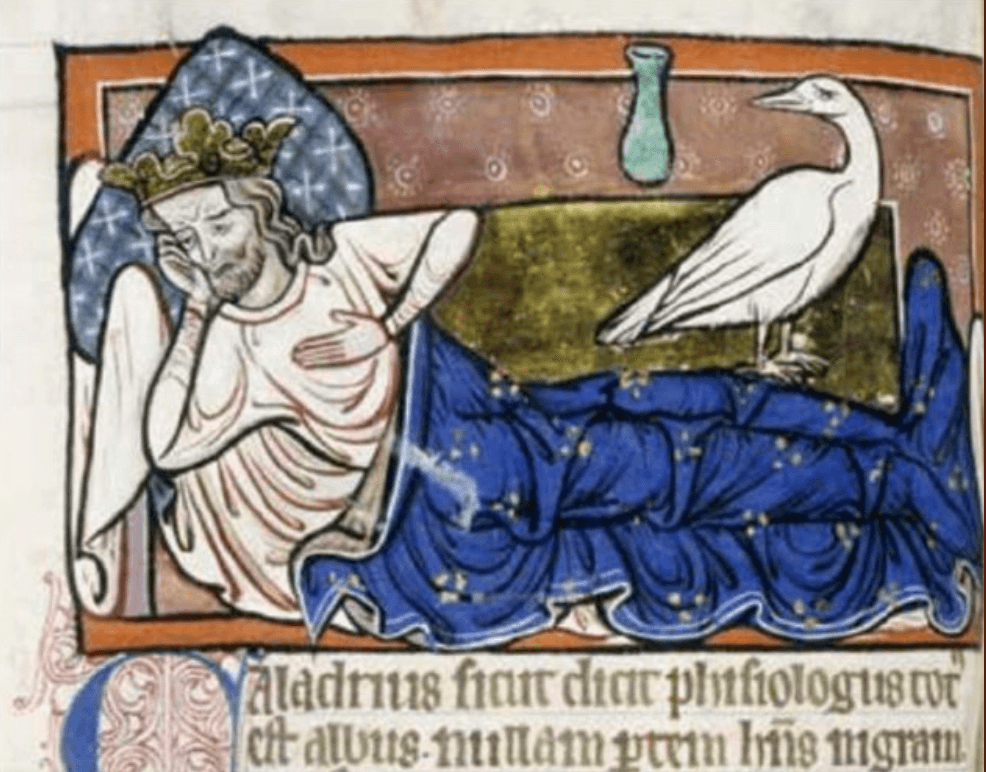
In the heart of every pure person, there is suppressed sin. Behind every sin, also conceals a pure personality. With a reference to the caladrius, the ‘Singer’ Mephisto should have become the saviour of this world. To become a medic who can cure illnesses. But eventually becomes a source of illness. Isn't this coexistence of redemption and fall in morals like Mephisto mentioned above?
We will talk about singing again. Mephisto loved to sing, until the end. ‘It wanted to sing. The singing flowed from its through, like whimpering, it became a terrible river.’ In the myth, singing is the life of a caladrius. They sing in various settings: Joy, sadness, anger, fear, love, etc. When their heart is the saddest, their song will be the most touching and the most beautiful.
But to them, the saddest moment is not just death, but when a loved one leaves. In the myths, choosing a partner will be the most important time of their lives. When they make their decision, there will be no changes, just as Mephisto lives to fulfil his vow with Faust.
If the partner unfortunately dies, the Caladrius will mourn for a few days. It will keep singing the same song, until all beings that hear the song will cry. And so Mephisto sings to convey the sorrow in his heart, which Faust will never get to listen anymore.
At the same time, they will not find any more partners and live alone for the rest of their lives. Due to this, there is a proverb that goes: as loyal as a caladrius, being one of Mephisto’s strongest traits. While his damaged throat prevented him from producing a beautiful song, many operators were reluctant to kill him, seeing the pitiful state he’s in.

Become silent
Maybe at that final moment, Mephisto did not think about just his death. And also the leaving of those he loved. He thought of the people who once journeyed with him: the one who was strict, the one who would cook delicious food, the one who sang to him, the one who guided him in his life, and the ones whom he never talked to but appreciated nonetheless.
He who loved to sing, his singing eventually ceased.
Other trivia
1. Mephisto might suffer from dependent personality disorder, characterized by his extreme dependence on Talulah and Faust when it comes to major decisions and emotional support, so much that all his decisions are based on what he thinks they will approve. He would also feel lost and lack purpose in life without the people he can trust. It is said that people with DPD are often those with a history of neglect and an abusive upbringing. Besides that, there are obvious signs of sociopathy with his severe lack of empathy, impulsiveness and inclination to violence that he consistently displays throughout the story.
2. Judging from the street view and mentions like Originium from the mines and infected children being driven away from the city, Sasha and Ino most definitely came from Ursus.
3. True to his origins, he carries a TT (Tula Tokarev) pistol around, a Russian handgun that was produced for the Soviet military to replace the Nagant M1895 Revolver, although the two were used in conjunction instead. Later they were both replaced by the Makarov pistol. Yes, these guns are playable T-Dolls in Girls’ Frontline.
As a side note, Tokarev lacks manual safety and relies on the half-cock safety notch on the hammer to keep the gun from firing, but is more fragile which can lead to accidental discharge when dropped or handled roughly. Fits Mephisto’s personality I guess. Failure to complete the cocking action leads ‘to go off half-cocked’, leaving the pistol unable to fire. It also means to take a premature or ill-considered action.
TT pistol can also withstand tremendous amount of abuse and still keep operating normally.
3. Mephisto’s dagger appears to be a dirk, a long thrusting dagger from Scotland that was used as a personal weapon for naval officers during the Age of Sail, gradually evolving into a ceremonial weapon and badge of office. The naval dirk became part of the uniform of naval officers and civilian officials in the Navy Department of the Russian Empire and in the Soviet navy an element of the dress uniform of officers.
4. He is afraid of Patriot for some reason, likely due to his seniority, their clashing ideals and disagreements over how Reunion should operate. Some people have also speculated that his own abusive father might have played a role in it. Ironically, Faust used to train with Patriot and FrostNova and was thus in a good relationship with them.
Both also feel very differently about their motherland Ursus. While Patriot’s reason for fighting by Reunion’s side is driven by his devotion to Ursus, Mephisto is motivated by his own hatred that runs deep due to his background.
5. In Darknights Memoir, Ines made a stealthy reference to Mephisto, calling him and some other squad leaders ‘children who are deliberately guided to become cruel’.
6. His mother is said to have left him at some point, making her the only (probably) still living relative of Mephisto.
7. Some fans speculate Mephisto to be an illegitimate child of a nobility. This is hinted by his unusual literacy at a very young age (not many adults could read in Russian Empire, let alone a child) and the fact that he often brought bread and books for Sasha. It would also neatly explain his frequent mistreatment in the hands of his own family and infected children on the streets.


